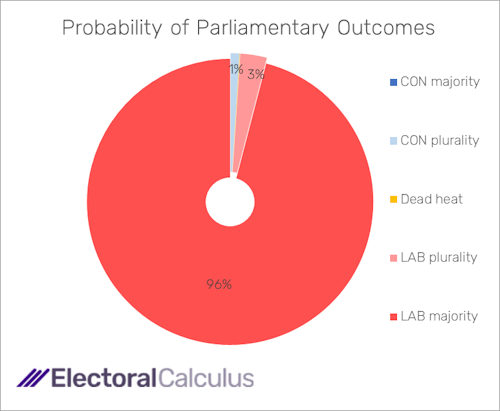The collapse in Conservative support has enabled Labour to claim to speak for England. Polls currently indicate that Labour would win 395 English seats at the forthcoming general election. Doing so would give it a parliamentary majority of 255 at the forthcoming general election. This would be the biggest sweep of seats since 1931, when the Conservatives won 436 English constituencies. The last time Labour could claim a parliamentary majority solely on the basis of winning seats in England was when it won 328 seats there in 1997.
Labour is predicted to win the most MPs in every English region. On current showing, Labour would win 96 of the 98 constituencies in the North East and North West of England and the Tories none. Labour can take almost all the seats in Greater London and gain a plurality of MPs in the commuter belt of the South-East and in the South-West of England.

Winning a majority in Scotland and Wales is superfluous in terms of parliamentary arithmetic but important politically, for it enables Labour to say it represents the whole of Britain. Current poll figures show Labour taking 30 of the 32 constituencies in Wales and the Tories none. In Scotland it can gain 28 seats, 10 more than the Scottish National Party, which has lost its position as Scotland's biggest party due to self-inflicted wounds.
Unlike the first Cabinet of Tony Blair, where Scottish voices were very prominent, the voices heard in Sir Keir Starmer's Cabinet will almost all be those of English MPs. Five-sixths would represent English constituencies, starting with Starmer whose constituency is within walking distance of Westminster. Almost all the Labour MPs returned from Scotland would be new to Parliament and even less informed about the politics of Whitehall. When demands for more devolution are made, a Labour government will find it easier to make concessions to Wales, where Labour is in control, than to Scotland with whatever leader the Scottish National Party throws up.
For the Conservative Party the probability of taking only 126 seats would be the party's worst defeat in its electoral history. There is a five percent possibility that the party could do much better, winning 244 seats. This would be a better showing than the three defeats it suffered when losing to Tony Blair's Labour Party. Losing office is always a disaster, but such an outcome could be considered not too disastrous. However, there is also a five percent possibility of the Conservatives gaining only 44 seats; by any standards this would be too disastrous.
The joker in the pack of parties is the anti-immigration Reform Party. Currently, it draws more support from voters than the Liberal Democrats. While unlikely to win any seats, it adds to the total number of Labour seats by reducing support for sitting Conservative MPs. If Nigel Farage were to take up the leadership of the Reform Party, this would almost certainly increase the number of Tory supporters emigrating to the Tories' right-wing competitor.
Richard Rose is Britain's senior psephologist and an expert on party government. His work has recently been appreciated in a new book 'The Problem of Governing: Essays for Richard Rose' published by Palgrave.